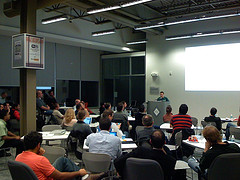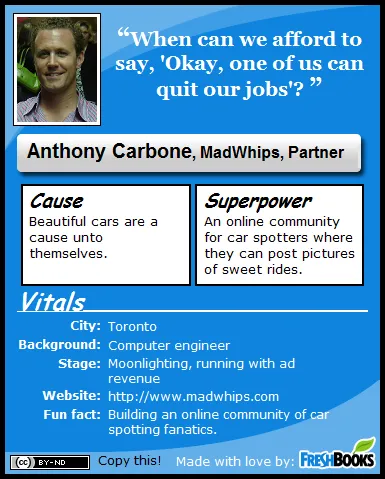Update #5: All tickets are currently sold out. We plan to release any remaining tickets this coming Friday at 2pm ET.
Update #4: 4 Service Provider tickets remain. Some people have been asking why we service providers are expected to purchase a sponsorship. The basic reason is that we have a very limited amount of tickets available, and in our experience (and we did ask for advice on this): tickets can be snatched up by service providers pretty quickly. Instead of shutting them out completely, we chose to offer a limited amount of spots to the most serious and dedicated of the group.
We will not let this event grow to the size of a FaceBookCamp or a DemoCamp. Because of the format and intent of startupcamp, startups will not benefit from a large group. Please feel free to drop us a note if you have any questions.
Update #3: Student tickets are now sold out.
Update #2: Guru tickets are now sold out.
Update: The Entrepreneur Round 1 tickets have sold out. We will be releasing a second round soon as well as doing a re-release of any tickets which were claimed by people not involved in startups. Stay tuned for updates about the second release of tickets.
If you aren’t able to get a ticket for Startupcamp, please remember that there is Democamp just a few nights before which has less of a startup focus.
 I am extremely happy to announce that we will be holding StartupCampToronto on December 6th.
I am extremely happy to announce that we will be holding StartupCampToronto on December 6th.
After we had such a great time in Waterloo, we knew the time was right to do it right here in Toronto.
We are simply announcing the event now and intend to fill in a lot of the blanks over the next few weeks. We have put together a small group to work out the details and that has been coming together nicely.
There are loads of great startups in Toronto and even more future entrepreneurs with great ideas and a great work ethic. Building a startup in Toronto is no picnic, and we think the best thing to do is to create an opportunity for those who are committed to their startups to share with and help each-other.
The format will be relatively simple. There will be 5 pitches by existing or soon-to-be startups. Each pitch is limited to 5 minutes and it is expected to cover the extent of your existing business plan. This may change, but it is the format right now. It worked extremely well in Waterloo a few weeks ago.
Entrepreneur, Student and Guru tickets are now available here. And of course, we aren’t charging for admission, but we are limiting the amount of tickets available.
We will email updates to ticket holders and post updates on the wiki.
Note: We have created specific ticket types in order to make sure that there is enough space for Students and Entrepenurs. If you are a consultant, web developer, lawyer, accountant or other type of service provider, we have created a special type of sponsorship opportunity for you. Please purchase the type of ticket that describes you accurately. We will be checking tickets and re-releasing any which are invalid.
We aren’t doing this to be jerks, we realize that a lot of people are excited about startups, but our focus is on helping existing startups who need advice now.



 Simon’s question when he got up was: “should this stay as a hobby, or should I start taking it seriously”. My advice is: focus on the product, keep iterating it in your own community, and put it in a couple of others. Once you get it right, start spreading it out and then quit your day job when you can afford to, but no sooner.
Simon’s question when he got up was: “should this stay as a hobby, or should I start taking it seriously”. My advice is: focus on the product, keep iterating it in your own community, and put it in a couple of others. Once you get it right, start spreading it out and then quit your day job when you can afford to, but no sooner.



 Here is where their story takes a turn for the better however. Just when we all thought that Savvica was done for, John and Malgosia did the smart thing. They didn’t “go out of business”, or take down the site. They didn’t declare it a failure and start preaching about all the lessons they learned. Instead, they kept burning a little midnight oil, still looking for a deal or an opportunity, and most of all, they kept their dream alive.
Here is where their story takes a turn for the better however. Just when we all thought that Savvica was done for, John and Malgosia did the smart thing. They didn’t “go out of business”, or take down the site. They didn’t declare it a failure and start preaching about all the lessons they learned. Instead, they kept burning a little midnight oil, still looking for a deal or an opportunity, and most of all, they kept their dream alive.